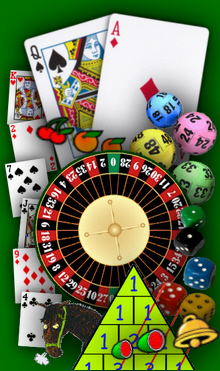|
|
Fractions and DecimalsThe traditional way of showing odds is a fraction such as 5/1. This means if you bet £1 and win, you receive £5 plus your £1 stake back making £6. The newer way of showing odds is decimal. The decimal says what you will receive back for £1 bet. If the fraction is 5/1, the decimal is 6 because if you win you get £6 back.
The table shows some common bookmaker's fractions with their decimal equivalents.
|
To work out the possible payout of an accumulator, we use the decimal odds. The best betting sites can display the odds either as the traditional fractions or as decimals. The side panel explains how they both work. >>>
An accumulator bet can cover up to 10 events or more, but let's start by looking at a simple treble bet on the winners of three horse races with decimal odds as follows:
|
Suppose you bet £1 on Starboy and it wins. The decimal odds are 2, which means you receive 2 x £1 = £2.
Now suppose you take your £2 and put that on Dandy and it wins. The odds are 8, so you receive £2 x 8 = £16.
You now take your £16 and put it on Redleg and it wins. The odds are 3.5 so your final cash return is 3.5 x £16 = £56.
Your £1 treble bet has turned into £56!
With an accumulator, these events can all happen at the same time, and the winnings automatically combine. To work out the odds of this accumulator bet you just multiply the decimal odds: 2 x 8 x 3.5 = 56.
Note: these decimal odds of 56 are the same as fraction odds of 55/1
Shorter Odds, Bigger Accumulators
|
 |
Your odds for the five-fold accumulator are 1.2 x 1.5 x 2.4 x 1.4 x 1.6 = 9.68
Therefore if you put £1 on and all teams win, you'll receive £9.68 back.
Each-Way Accumulators
Each-Way BetsAn EW bet is two bets. One bet is to win and the second bet is to place (i.e. for a horse to come 2nd or 3rd in the race. If there are a large number of runners, the bookmaker may even count 4th as a place.) The odds given for the place are usually 1/5 of the win odds. If a horse is 10/1 to win, then the place will be 2/1. In decimal odds, this win is 11 and the place is 3. If you are backing a single horse for £1 each-way, you pay for both bets, so this costs £2. Suppose you bet £5 EW on a horse at 10/1. Your stake is 2 x £5 = £10.
|
In normal accumulators, every event you bet on has to win. If just one loses then you come away with nothing! However in horse racing and some other events, it is possible to have an each-way accumulator.
Let's look at our three horses again, but this time with the place odds included.
|
Let's put £1 on an each-way accumulator for all three races. This will cost us £2.
- If all three horses win, we receive the win bets £1 x 2 x 8 x 3.5 = £56 PLUS we receive the place bets £1 x 1.2 x 2.4 x 1.5 = £4.32 making £60.32 in total.
- If one, two or all three horses place instead of winning, we just receive the place bets £1 x 1.2 x 2.4 x 1.5 = £4.32.
Note: if two horses win and one places, we don't get any more than if the horses all place! - If any horse doesn't win or place, then we lose.
Multiple Bet Combinations and the Bookie's profit!
 For information on Doubles, Trixies, Patents, Heinz, Yankees and more...
For information on Doubles, Trixies, Patents, Heinz, Yankees and more...
The Betting Guide - and how to work out the Bookie's profit
Craps - How to play, Chances and Payouts
Blackjack - Hit, Stand, Double Down or Split?
The Betting Guide - and how to work out the Bookie's profit!
The Roulette Wheel ... and how to worry the casino!
The One-Armed Bandit Slot Machine
 There are more stats and facts about games here:
There are more stats and facts about games here:
 A Guide to Accumulator Bets
A Guide to Accumulator Bets